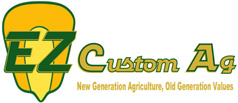Hi, my name is Zach Monroe Co-owner of EZ Custom Ag Services. Out here standing in some corn today, it’s pretty close to tassel and you know, as we’re getting into this time of year, the hot topic is fundicide.
You know, the when, the how and the why. Well, there’s some determining factors when you go out and walk and look for disease. There’s plant health benefits to be reaped out here by fungicide application.
There’s different ways to put on a fungicide when you come out here with a ground rig, a high -boy sprayer. We could come out here and we can have an airplane or helicopter come across there. We prefer a ground application as we’re able to put more gallons on the plant, cover the entirety of the plant, and hit more leaf surface. That’s really the ultimate goal here.
Coming out here to make a decision on fungicide is a tough one. I think doing any fungicide application is better than doing none. I think that there’s a lot of benefit to be reaped in the plant health side of it. You know, with standability, stalk strength, translocation nutrients, and really, it’s a great thing to put on.
You know, we’ll extend the life of this corn and really push it to its full yield potential. If we can get the disease out of here or at least hold it off because it’s nearly inevitable. Especially in our area, we’ve seen a lot of gloomy wet days and when we’re considering hours of leaf wetness when we get into disease pressures, we’ve had a lot of hours of leaf wetness and we’ve had some gloomy days here, so disease is inevitable. We’re going to deal with it and we’re going to go out here preemptively and we’re going to put on fungicide.
Now there’s a few different modes of action in fungicides. We’ve got Trizol, Strobi, SDHI’s and really we like to see somebody go out here, if they’re going to choose to spend the money, it is a pricey application. If you’re going to go out and spend the money on the application, let’s use a quality product. Let’s use multiple modes of action. Let’s not go out here with the cheapest thing so we can check the box that we put on fungicide. It’s a great time that we can really get out here and see what we got and let’s make the best of it.
We’re here in central Ohio and a few of the diseases that we’re commonly going to see here are, gray leaf spot, northern corn leaf blight, kind of newer to us but coming into the area is tar spot, and gray leaf spot. When I look towards the bottom of the plant, it’s going to work its way up. So, really getting out there and walking your fields and just keeping an eye on things, setting a baseline for yourself early, and then just keep walking these fields, noticing changes in your leaf structure.
Now, this all starts with hybrid selection, and then really from there on out, it’s scouting fields, it’s understanding what you’ve got out here, really taking a good look at your fields. Remember that an ounce of prevention is worth a pound of cure. And we’ll see you next time, guys.
